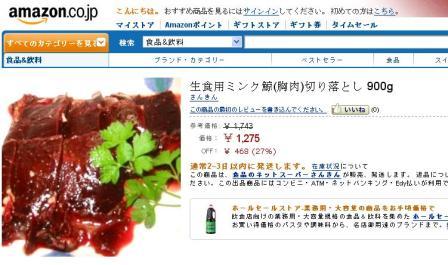Retail giant Amazon.com was exposed on Tuesday (February 21) as selling endangered whale and dolphin meat among their expansive list of online offerings on its Japanese website. However, following international outcry Amazon reportedly pulled these products from their website by Wednesday, with searches for all things cetaceans now coming up empty.
 Photo courtesy Environmental Investigation Agency“Minke whales to be eaten raw”, one of the cetacean food products on sale on Amazon Japan until last
Photo courtesy Environmental Investigation Agency“Minke whales to be eaten raw”, one of the cetacean food products on sale on Amazon Japan until last
Tuesday (February 21).
According to “Amazon.com’s Unpalatable Profits” — a report released by the Environmental Investigation Agency (EIA) and the Humane Society International, a startling 147 different products derived from whales, dolphins and porpoises were found for sale on Amazon’s Japanese subsidiary, Amazon Japan, even though company policy prohibits the sale of unlicensed or illegal wildlife products and endangered species.
Among whale species being sold on the online shopping portal were sei, fin, Bryde’s and minke, which are all protected by the Convention on International Trade in Endangered Species of Wild Fauna and Flora (CITES). Some of the endangered whales, such as sei and minke, are harvested as a part of Japan’s controversial whaling program which exploits a loophole in the International Whaling Commission (IWC)s’ global moratorium that allows for a scientific research quota. The fin whale comes from Iceland’s openly commercial hunts, which not only violate the IWC’s moratorium but also the Pelly Amendment, which led US president Barack Obama to consider trade sanctions against the nation in 2011.
Whale bacon, canned whale, whale stew and a slew of other cetacean-derived products were discovered among Amazon Japan’s online offerings, as well as dolphin and pilot whale sourced from the drive hunts that are depicted in the 2009 documentary The Cove.
In direct contravention to Japanese labeling laws, about a third of the observed products did not include a mandatory label indicating the species. It is also suspected that much of the meat labeled as ‘whale’ was in fact dolphin, sourced from the infamous town of Taiji.
In addition to the ethical concerns regarding the consumption of sentient animals, there are significant human health issues. EIA investigators analyzed cetacean products they had purchased from the website, and discovered mercury levels of 20ppm (parts per million), which far exceeds the Japanese 0.4ppm national limit for mercury in seafood.
Within 24 hours of the EIA report being released, tens of thousands of activists mobilized around the world. Petitions were signed, Amazon’s Twitter and Facebook pages were bombarded, and letters were sent to CEO Jeff Bezos calling on him to honor Amazon’s purported goal of “constantly looking for ways to further reduce our environmental impact.”
The Internet retail giant responded to the outcry against by removing all cetacean products from the site overnight.
This is an important first step. But remains to be seen if Amazon will make a formal commitment to protect cetaceans and enact a permanent ban on all whale, dolphin, and porpoise products from their website.
Laura Bridgeman has long been interested in environmental issues. After graduating from university in Canada, she came to work with the Earth Island Institute to follow her passion. She works closely with Ric O’Barry’s Save Japan Dolphins project and is also involved in fostering youth leadership with the Institute’s New Leaders Initiative.
We don’t have a paywall because, as a nonprofit publication, our mission is to inform, educate and inspire action to protect our living world. Which is why we rely on readers like you for support. If you believe in the work we do, please consider making a tax-deductible year-end donation to our Green Journalism Fund.
Donate